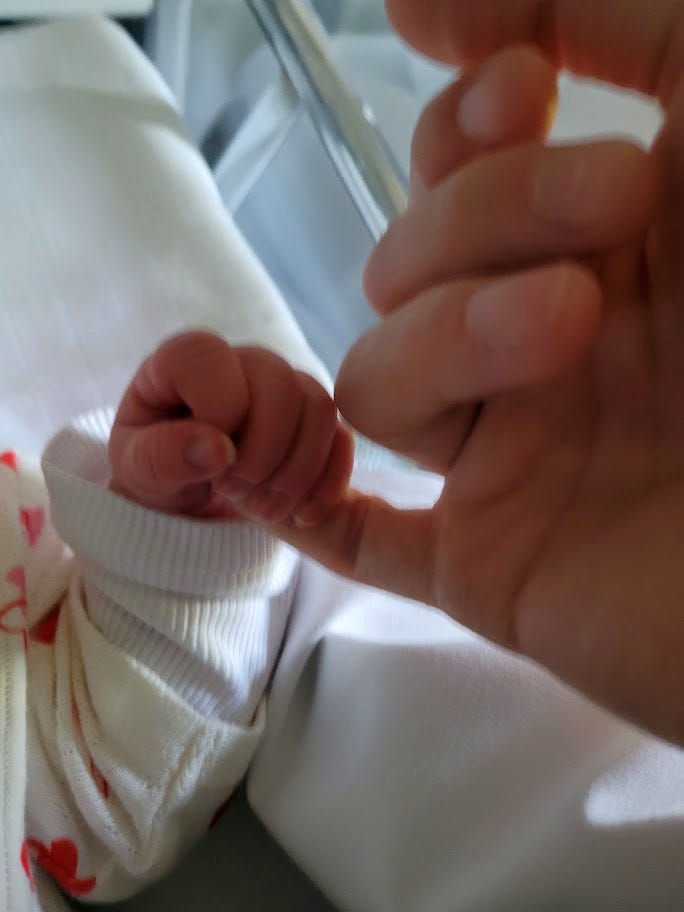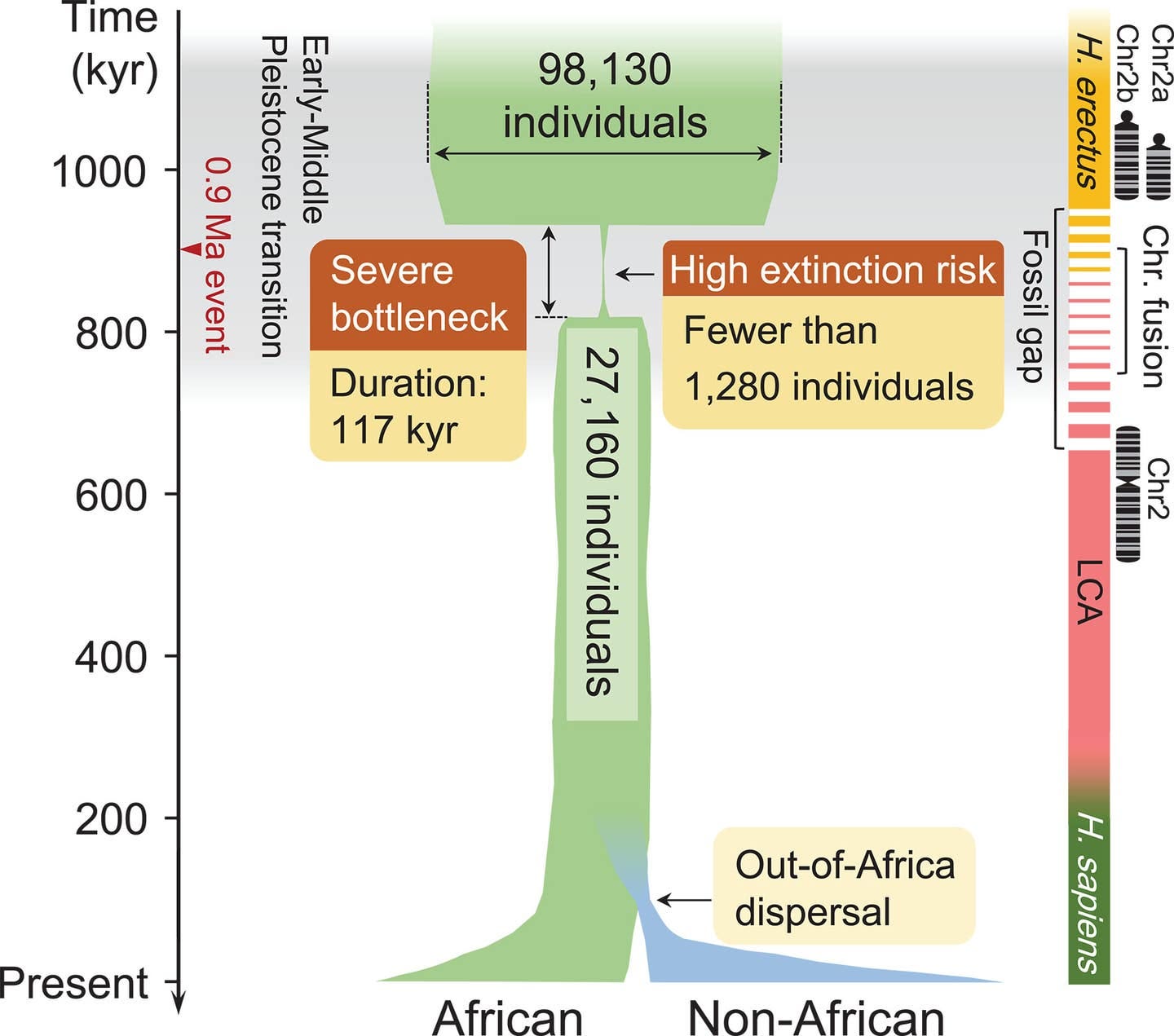Repronews #72: Getting personal
CDC’s IVF team gutted | The Atlantic: maximizing births through inclusive IVF | Korea’s genetically-adapted diver-women | >900 genes for osteoarthritis | population collapse 930,000 years ago
Welcome to the latest issue of Repronews! This edition has been delayed due to a not insignificant piece of personal repronews: the birth of our second daughter! Everyone is well, even our sleep schedule is improving. All the same, future editions may also be less regular.
Highlights from this week’s edition:
Repro/genetics
Trump administration guts CDC’s IVF team
Population Policies & Trends
The Atlantic’s Faith Hill argues maximizing U.S. fertility means subsidizing IVF for all family types
Genetic Studies
Korea’s Haenyo women have “unique genetic adaptations” due a lifestyle of underwater diving
Largest osteoarthritis GWAS ever identifies almost 1000 genes linked to the disease
Further Learning
Our ancestors almost went extinct 930,000 years ago as the population collapsed to less than 1300 people
Repro/genetics
“CDC’s IVF team gutted even as Trump calls himself the ‘fertilization president’“ (NBC News)
The U.S. Centers for Disease Control and Prevention’s (CDC) Assisted Reproductive Technology Surveillance Team has been eliminated by the Trump administration.
The six-person team of epidemiologists, data analysts, and researchers was tasked with track IVF success across the United States.
“The data was produced at the clinic level every year, so you could say, ‘Is this clinic successful 15% of the time, 20% of the time, 25% of the time,’” said Aaron Levine, a professor of public policy at Georgia Tech and a CDC collaborator. “You can imagine that is super valuable information for patients considering IVF, or maybe considering IVF at multiple clinics, and trying to make their choices.”
The team tracked IVF outcomes, such as whether women gave multiple births or delivered prematurely, and did research on makign IVF more efficient, safer, and more accessible. It also provided tools to the public such as an “IVF success estimator” to allow people estimate their chances of IVF working.
In March, President Donald Trump styled himself “the fertilization president.”
The Trump administration has committed to imminently issuing an executive order promoting IVF.
More on repro/genetics:
Births from IVF in the U.S. increased 4.4% between 2022 and 2023, rising to 95,860, or 2.6% of the nation’s births (ASRM)
Misleading terminology on “restorative reproductive medicine” and “ethical IVF” being used to restrict IVF access (ASRM)
Podcast: “What can state-funded IVF do for population growth?” (PET)
“Healing before birth: How genetic screening is changing lives” (Forbes)
“Communitarian ethics perspective on UK biobanking: The Newborn Genomes Programme” (JoME)
“Silicon Valley’s consumer eugenics” (Commentary)
Population Policies & Trends
“The pro-family policy this nation actually needs” (The Atlantic)
According to a Pew Research Center report, in 1970, 67% of Americans aged 25-49 lived with a spouse and at least one child. By 2023, that number had plummeted to 37%. The traditional family is no longer a majority in this age group.
The Atlantic’s Faith Hill argues that defining marriage narrowly between heterosexuals “wouldn’t just be a moral mistake; it would also be a strategic one. … [I]f raising fertility rates is the goal, Trump’s team should be embracing the many kinds of families that already exist—and lowering barriers for all the people hoping to start new ones.”
Today, the people most likely to marry in the U.S. are affluent, straight, educated, and White or Asian.
Hill points to evidence suggesting gay couples or single parents may be more involved in their children’s lives, as their decision to become parents may be more willful and involve intentionally overcoming more obstacles.
She calls on policymakers to subsidize IVF and other reproductive technologies, extend family leave policies to helpful relatives (such as grandparents or other carers), and finance childcare regardless of family type.
More on population policies and trends:
“MAGA’s era of ‘soft eugenics’: Let the weak get sick, help the clever breed” (The Guardian)
“‘A slippery slope to eugenics’: Advocates reject RFK Jr.’s national autism database” (The Guardian)
Genetic Studies
“Korea’s ‘amazing’ Haenyeo divers show unique genetic adaptations” (The Hindu)
A new study has found evidence of both genetic adaptation and physiological changes among the Haenyeo.
The Haenyo are unique group of women in South Korea’s Jeju Island known for diving up to 10 meters underwater and up to seven hours a day to collect shellfish.
The researchers explored whether long-term diving practice and natural selection have shaped distinct Haenyeo genetics, particularly relative to bradycardia (the slowing of heart rate), blood pressure regulation, cold tolerance and pregnancy-related cardiovascular stress.
With whole-genome sequencing, researchers confirmed that Jeju Islanders— both Haenyeo and non-Haenyeo— are genetically distinct from mainland Koreans. Populations began to diverge around 5,000-7,000 years ago.
A genetic variant identified in the study is more common in Jeju residents and may reduce pregnancy-associated hypertension risks.
This variant also correlated with changes in the expression levels of some other genes with known roles in immune modulation and hypertension. Natural selection among the Haenyeo may have targeted the variant to reduce the risk of preeclampsia in diving pregnant women.
“The Haenyeo are amazing, and their incredible ability is written in their genes,” University of Utah geneticist and study coauthor Melissa Ilardo. “The fact that women are diving through their pregnancy, which is a really tough thing to do, has actually influenced an entire island’s people.”
The Jeju-Haenyeo culture has been celebrated by being included in UNESCO’s Intangible Cultural Heritage list in 2016.
“Almost 1000 genetic links to osteoarthritis uncovered” (PET)
A large-scale genome-wide association study (GWAS) has discovered potential therapeutic targets for osteoarthritis.
Osteoarthritis, caused by the breakdown of cartilage in joints, is the third-fastest growing health condition causing disability and is forecast to affect one billion people worldwide by 2050.
Researchers conducted the largest ever GWAS into osteoarthritis by analyzing nearly two million genomes. This revealed 962 genetic loci significantly linked to the condition. Over 500 of these associations had never previously been identified.
“Genetic variants associated with osteoarthritis risk are widespread across osteoarthritis patients,” said study author Dr. Konstantinos Hatzikotoulas. “Our newly gained knowledge about them can enable improved patient selection for clinical trials and personalized medicine approaches.”
No therapies currently exist for osteoarthritis that delay or reverse disease progression, with interventions limited to pain management or joint replacement.
The study suggests existing drugs could be repurposed to treat the condition: 10% of the genes identified as linked to osteoarthritis encode proteins targeted by existing therapies.
Functional analyses of the genes and biological modeling are needed to determine the role these variants play in osteoarthritis development.
Further research is also needed to identify genetic risk factors for osteoarthritis in people of non-European descent. 87% of genomes analyzed in the study came from individuals of European ancestry.
More on genetic studies:
“Don’t need much sleep? Mutation linked to thriving with little rest” (Nature)
“Genetics may influence age at which children first walk” (PET)
“The heritability of IQ increases with age: A counterintuitive but highly replicable finding” (Steve Stewart-Williams)
Further Learning
“Humans ancestors nearly went extinct 930,000 years ago” (Brighter Side)
A genetic study reveals our human ancestors survived a dramatic population collapse almost 1 million years ago.
The population crash occurred between 930,000 and 813,000 years ago, during which an average of only 1,280 individuals survived.
The bottleneck was associated with a 66% losss in genetic diversity, reshaping our gene pool. This included the merger of two chromosomes into our current chromosome 2, contributing to divergence from Neanderthals and Denisovans.
The period coincides with a a gap in the African and Eurasian fossil records.
Yi-Hsuan Pan, a genomic researcher from East China Normal University, said: “The novel finding opens a new field in human evolution because it evokes many questions, such as the places where these individuals lived, how they overcame catastrophic climate changes, and whether natural selection during the bottleneck accelerated the evolution of the human brain.”
The bottleneck may have happened due to harsh ice ages and prolonged droughts.
The researchers argue natural selection played a critical role in this period and the development of traits suited to extreme survival conditions, possibly speeding up brain evolution, advanced cognitive abilities, and complex social structures.
Li Haipeng, a computational biologist at the Shanghai Institute of Nutrition and Health, said: “Future goals with this knowledge aim to paint a more complete picture of human evolution during this period, unraveling the mystery that is early human ancestry and evolution.”
More on human nature, evolution, and biotech:
Human nature
fMRI brain scans show different parts of the brain light up for Democrats and Republics when making food purchasing decisions (P&LS)
“How men and women rate each other on dating sites” (Steve Stewart-Williams)
“How much of the grade differences between boys and girls can be explained by differences in maturation?” (ScienceNorway)
Disability journalist S. E. Smith writes that “eliminating eugenic beliefs … may require dismantling the United States itself” (The Conversationalist)
Evolution
“Convergent evolution: How complex brains developed independently in humans, birds and reptiles” (NPR/GLP)
Biotech
“Argentina’s scientists create gene-edited polo ‘super ponies’” (Legal Insurrection)
“Inside the first European gene-edited wheat field trial” (Euronews)
“The US has approved CRISPR pigs for food” (MIT Tech Review)
Industry polls finds 80% of British Zoomers support gene-edited crops (British Sugar)
New European biotech act: Which way forward? (European Parliamentary Research Service)
Disclaimer: We cannot fact-check the linked-to stories and studies, nor do the views expressed necessarily reflect our own.



